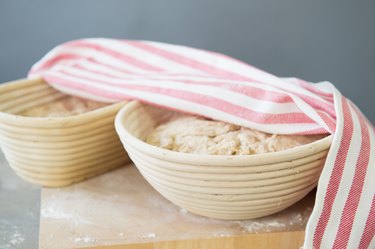
The comforting, inviting smell of home-baked bread should be reason enough to try baking at home. Home-baked bread can also offer more nutrients and fewer additives than commercially manufactured breads. Although baking bread takes some time and finesse, the taste and nutritional impact of baking your own loaves makes the effort worthwhile.
Healthier Ingredients
Video of the Day
You select all the ingredients that go into your homemade bread. You can choose the highest quality flours – or grind your own – leavening agents, eggs and dairy. You also control the sugar content and do not have to worry about the addition of high fructose corn syrup or dextrose, which offer empty calories. Unless you add it yourself with margarine or vegetable shortening, homemade bread does not contain trans fats; you can use heart-healthy unsaturated fats such as olive or safflower oil instead. Commercially prepared breads often contain preservatives and artificial ingredients to extend their shelf life and boost flavor, while homemade breads do not.
Video of the Day
Lower Sodium
Many commercially prepared breads contain over 130 mg of sodium per slice. If you prepare your own at home, you can limit the amount of salt in the loaf.
Whole Grains
The USDA recommends consuming at least 3 oz. of whole grains daily. Labels on commercial breads can lead you to believe they contain more whole grains than they actually do. When you prepare bread at home, you can be sure of the amount of whole grains included in the recipe. You can make a heartier, healthier bread by using 100 percent whole wheat flour or other whole grain flours. Whole wheat flour has more fiber and nutrients than refined white flour. When you bake your own bread, you can also experiment by adding in other grains or ingredients to boost nutrition. Consider adding ground flaxseed for omega-3 fatty acids, whole oats for soluble fiber or quinoa flour for protein.
Allergen-Free
If you have serious food allergies, you can tailor your bread recipes to leave out the offending ingredients. Even manufactured breads that do not contain the allergen may have been produced on equipment contaminated with it. Making your own bread prevents almost all possibility of cross-contamination.